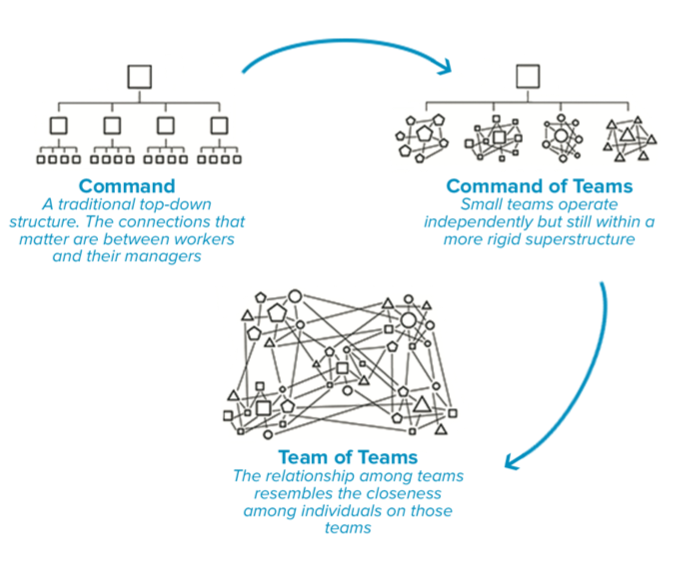By Cédric Blum, Customer Care Expert, and Julien Rio, Marketing Director at RingCentral Engage Digital…
Agents are the heart beats of contact centres and customer service departments: the quality of customer service and customers’ satisfaction heavily depends on their skills, motivation and ability to solve customers’ problems. 66% of consumers say their experience with agents impacted their impression of the brand.
To adapt to changing customers’ expectations, companies are progressively moving to omni-digital customer care, to be present on a variety of channels such as messaging, live-chat, social media, email… As part of this transition from phone to digital channels and to meet their customer’s expectations, companies need to now move away from traditional organisation models. By giving individuals and teams more freedom to self-manage, while staying aligned to the organisation’s purpose, a new model adapted to Omni-Digital empowers agents and contributes to a better customer experience.
1. Motivating agents to increase retention
With an average staff turnover rate of 30 to 45% in contact centres and customer service teams, hiring and retaining agents is a major challenge. The bathtub is leaking and it’s getting more and more difficult to keep it filled. The resource pool around contact centres is drained, hiring efficiency is getting lower and the tenancy in contact centres is either very low (below 2 years) or very high above 10.
One of the reasons for the high turnover rate is that agents are restricted by set processes and structure – leading to boredom. Many other things contribute to a lack of motivation including working on repetitive tasks, having to deal with angry and disrespectful customers, working in poor working environments, being constrained by time limits for each interaction, etc…
Empowering agents with an Omni-Digital Strategy can actually help retain agents and give them a sense of achievement: Prevent them from leaving and prevent having to replace them at such a high rate.
2. Provide better resolution through the “Team of teams” approach
With the existing “front to back” model, agents constantly have to ask for information and permission from managers and other departments, increasing the response time and making their job less valuable. To be able to answer queries efficiently, without complicating the customer journey, agents should be able to easily and swiftly get information from other departments. They should also be able to gain a certain level of autonomy, to take decisions helping the customer while staying in a defined framework.
The “Team of teams” approach is an organisational and decision-making structure developed by General McChrystal. This focuses on decentralised decision making, with top managers creating a common purpose. Instead of operating top-down, power is distributed throughout the organisation, giving individuals and teams more freedom to self-manage, while staying aligned to the organisation’s purpose.

3. Create a more transparent culture
Monitoring performance, setting objectives and transparency are key to facilitating a company’s digital transformation. Transparency is central to ‘team of teams’: By sharing objectives and results with all employees they are made to feel more motivated and valued within the company. Transparency has to work in two ways: from managers to employees and in the other way. Getting feedback from employees allows companies to fix problems in a reactive way. Also, creating a safe space for a team to share critical feedback or ask hard questions is key to building a strong, transparent culture.
Adopting this approach is also an opportunity to leverage the knowledge of frontline employees. Statistics from the “The Iceberg of Ignorance” suggest that only 4% of problems are known by top management and 100% are known to frontline employees. Adopting a new model with an inverted chart is an opportunity to reduce this gap and getting senior management to be more aware of problems.
A large part of Objective and Key Results (OKR) is making sure each individual knows what’s expected of them at work. OKRs are kept public in front of everyone, so people and teams move towards the same goals and know what others are focusing on.
4. Create a more customer-centric culture through team management
Autonomy and accountability are the main drivers of handing power to agents. An inverted organisation chart can put more focus on employees.
To accompany their digital transformation, companies need also to rely on team members who are used to digital. Skill sets for managing written interactions are not the same as the ones for phone. Social skills are essential for communicating efficiently with customers as well. Agents should have a customer service approach in mind and the willingness to solve their problems.
In the Omni-Digital World of customer care, openly rewarding employees engenders a positive mood and atmosphere in the company. Achievements (such as working outside of your comfort zone) can generate points for the agents. Points and achievements lead to rewards and those should not be necessarily in monetary form. Gamification can be used to motivate employees, to engage with them, reward them, and optimise workflow. Young professionals find this kind of environment very attractive thereby helping recruitment. In the end, adapting team management with this kind of strategy motivates agents to solve customers’ problems more efficiently, contributing to an enhanced customer experience.
To conclude, bringing the Omni-Digital model into an organisation isn’t just about the process of customer service. It helps many more aspects of the organisation: From employee and customer satisfaction through to workplace culture the benefits are many. Omni-Digital is the future for customer experience of any brand large or small.
To learn more about this topic, you can download RingCentral Engage Digital’s guide: Organizing your contact centre for Omni-Digital Customer Care
To learn more about this topic, you can download RingCentral Engage Digital’s guide: Organizing your contact center for Omni-Digital Customer Care